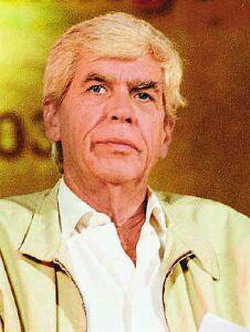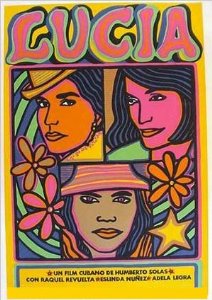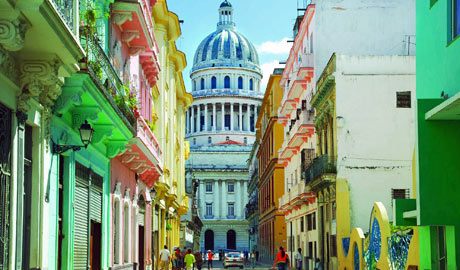HUMBERTO SOLÁS, FILM DIRECTOR.
Humberto Solas Borrego was one of the great filmmakers of the revolutionary Cuba, born in La Habana on 14 December 1941 and died 18 September 2008).
Humberto Solás entered the film industry as a teenager, and made his first short at 18.
After taking a film course at Centro Sperimentale de Cinema in Rome, he made a big impression with his 1966 medium-lenght fiction “Manuela”, the first of many films dedicated to the Cuban woman.
His cinematic style borrows from Luchino Visconti’s mise en scene and is permeated by sometimes heavy melodrama.
He started making shorts at a very young age and directed his first medium length film Manuela in 1966. The success of this film led him to direct Lucía, told in three stories in different moments of Cuban history, all seen through the eyes of a different woman named Lucia.
In 1968 his masterpiece “Lucía” won many prizes and brought him international recognition. But the so-called “parametrización” (discredit or persecution of homosexuals and other “anti-socials”) during the early 70’s, prevented him from making more personal films.
In the 80s he had a big success with “Cecilia”, followed by a big controversy due to his free adaptation (along with this longtime friend and collaborator, editor Nelson Rodríguez, and Norma Torrado, editor of documentalist Santiago Alvarez’ classics “LBJ” and “Now”) of “Cecilia Valdés o La loma del ángel”, considered the “national novel” in Cuba. After this scandal, he proved he could make a film on time and under budget with “Amada” (co-directed with Rodríguez) and had another big hit with “Un hombre de éxito”, which won first prize in the Havana and Cartagena film festivals.
Solás has won 13 awards for filmmaking and been nominated for an additional nine. His 1968 film Lucía won the Golden Prize and the Prix FIPRESCI at the 6th Moscow International Film Festival.
In 1977 he was a member of the jury at the 10th Moscow International Film Festival.
He has twice served on the jury at the Berlin International Film Festival, in 1977[7] and 1997.[8] In 2003, he founded Gibara’s Poor Cinema Festival, “open to filmmakers with limited funds”. Solás was awarded Cuba’s National Film Prize in 2005.
His 1985 film A Successful Man was entered into the 15th Moscow International Film Festival.
In 1992 he realized an old dream, when he filmed Alejo Carpentier’s epic novel “El siglo de las luces” for French television.
Humberto Solás died of cancer on September 18, 2008, at the age of 66.
Filmography.
Solás directed twenty-four films, from La Huida in 1959 to Barrio Cuba and Adela in 2005, wrote twelve and produced one.
The following is an incomplete filmography:
1958: La Huida
1963: El refrato (short)
1964: El Acoso (short)
1966: Manuela
1968: Lucía
1972: Un dia de noviembre
1975: Cantata de Chile
1981: Cecilia
1986: Un hombre de exito
1991: El siglo de las Luces
2001: Miel para Oshun
2005: Barrio Cuba
2005: Adela
Wiki/IMDb/Edgar Soberón/InternetPhotos/YouTube/TheCubanHistory.com
The Cuban History, Hollywood.
Arnoldo Varona, Editor.
HUMBERTO SOLÁS, CINEASTA, PRODUCTOR DE CINE. .
Humberto Solás Borrego fue uno de los grandes cineastas de la Cuba revolucionaria, nacida en La Habana el 14 de diciembre de 1941 y murió el 18 de septiembre de 2008).
Humberto Solás entró en la industria del cine como un adolescente, e hizo su primer cortometraje en 18.
Después de tomar un curso de cine en el Centro Sperimentale de Cine de Roma, que hizo una gran impresión con su 1966 medio-longitud ficción “Manuela”, la primera de muchas películas dedicado a la mujer cubana.
Su estilo cinematográfico toma prestado de la puesta de Luchino Visconti en escena y está permeada por el melodrama veces pesado.
Él comenzó a hacer cortometrajes a una edad muy joven y dirigió su primer mediometraje Manuela en 1966. El éxito de esta película le llevó a dirigir Lucía, dijo en tres historias en diferentes momentos de la historia de Cuba, todo visto a través de los ojos de un diferente mujer llamada Lucía.
En 1968 su obra maestra “Lucía” ganó muchos premios y le trajo el reconocimiento internacional. Pero el llamado “parametrización” (desacreditar o persecución de los homosexuales y otros “antisociales”) durante la década de los 70, le impidió hacer películas más personales.
En los años 80 tuvo un gran éxito con “Cecilia”, seguido de una gran controversia debido a su adaptación libre (junto con este viejo amigo y colaborador, editor Nelson Rodríguez, y Norma Torrado, director de clásicos documentalista Santiago Alvarez “LBJ” y “Ahora”) de “Cecilia Valdés o La loma del ángel”, considerada la “novela nacional” en Cuba. Después de este escándalo, él demostró que podía hacer una película a tiempo y dentro del presupuesto con “Amada” (co-dirigido con Rodríguez) y tuvo otro gran éxito con “Un hombre de éxito”, que ganó el primer premio en la película La Habana y Cartagena festivales.
Solás ha ganado 13 premios para el cine y ha sido nominado para un adicional de nueve. Su película de 1968 Lucía ganó el Premio de Oro y el Premio FIPRESCI en el sexto Festival Internacional de Cine de Moscú.
En 1977 fue miembro del jurado en el 10º Festival Internacional de Cine de Moscú.
Él ha servido dos veces en el jurado en el Festival Internacional de Cine de Berlín, en 1977 [7] y 1997 [8] En 2003, fundó el Festival de Cine Pobre de Gibara, “abierto a realizadores con fondos limitados”. Solás fue galardonado con el Premio Nacional de Cine de Cuba en 2005.
Su película de 1985 Un hombre de éxito se inscribió en el 15to Festival Internacional de Cine de Moscú.
En 1992 se dio cuenta de un viejo sueño, cuando filmó la novela épica de Alejo Carpentier “El siglo de las luces” para la televisión francesa.
Humberto Solás murió de cáncer el 18 de septiembre de 2008, a la edad de 66.
Filmografía.
Solás dirigió veinticuatro películas, de La Huida en 1959 a Barrio Cuba y Adela en 2005, escribió doce y produjo uno.
La siguiente es una filmografía incompleta:
1958: La Huida
1963: El refrato (corto)
1964: El acoso (corto)
1966: Manuela
1968: Lucía
1972: Un día de noviembre
1975: Cantata de Chile
1981: Cecilia
1986: Un hombre de éxito
1991: El Siglo de las Luces
2001: Miel para Oshun
2005: Barrio Cuba
2005: Adela
Wiki / IMDb / Edgar Soberón / InternetPhotos / YouTube / TheCubanHistory.com
La Historia de Cuba, de Hollywood.
Arnoldo Varona, Editor.



 HUMBERTO SOLÁS, FILM DIRECTOR. (Born: Havana) + Humberto Solás, Productor de Cine. (Nacido en La Habana).
HUMBERTO SOLÁS, FILM DIRECTOR. (Born: Havana) + Humberto Solás, Productor de Cine. (Nacido en La Habana).

